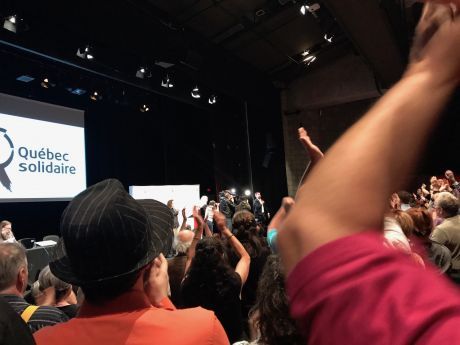News
You are here
Québec solidaire makes historic strides

June 1, 2017
At the largest convention in its eleven-year history, on the May long weekend, Québec solidaire (QS) had a critical choice to make.
The Parti québécois (PQ) had been courting QS to join in some kind of electoral pact to secure the defeat of the Quebec Liberals, who have ruled unseated for nearly 15 years.
The Liberals were briefly tossed out by the Quebec Spring of 2012, one of the largest mass movements in Quebec's history. It brought the PQ to power and forced them to repeal the tuition hike that provoked it and the legislation passed to repress it. But that PQ government fell before the end of its mandate, due to the introduction of an austerity budget and its racist Charter of Values, which targeted Quebec Muslims in particular.
Three years later, despite the mass desire to unseat the re-coronated Liberals, QS, a party of the ballot and of the street, rejected not only strategic voting but any notion of the PQ as a party of the left.
It was a challenging debate for the several hundred delegates gathered in Montreal. Some high profile QS members supported some kind of "open door" to potential pacts with the PQ, like Amir Khadir, first of QS's three elected MNAs, and Gabriel Nadeau-Dubois (GND), leader of the student strike that led to the Quebec Spring. When GND announced in March that he would run as a QS candidate, 7000 new members joined QS in two weeks, and he was elected male co-spokesperson at the May convention.
Nevertheless, two issues made the choice for delegates clear.
Despite its ambiguous history as Quebec's only "left" party, long linked to the labour movement, the PQ took a yet another decisive turn towards right populist politics with the election of party leader Jean-Francois Lisée and his embrace of a renewed racist Charter of Values. The Anti-Racism Committee of QS lobbied delegates about this danger, as did speaker after speaker at the Convention, from high-profile Muslim activist Dahlia Awada to an Inuit member, who said this is a historic moment for QS to win Indigenous and racialized communities within Quebec away from traditional politics, particularly the Liberal vote, and this can only be done through a clear rejection of the PQ's politics of exclusion.
Still others spoke about the deep distrust of the PQ due both to racism and the politics of austerity. Pierre-Karl Péladeau, who Lisée replaced as leader, was the most notoriously repressive employer in Quebec. One speaker during the debate made the point that whenever the PQ has been in power the slogans of labour go from fighting ones to apologetic ones. As QS labour and anti-poverty activists argued, electoral pacts deny poor and working people in non-urban areas their right to a left vote. Voters should not be traded like hockey cards.
The PQ had far more to gain from an alliance than QS did. Though QS faced some backlash for its decision, what it would have lost in credibility would have been far greater.
In the end the PQ's courting of QS was exposed for what it was: a desperate attempt by a party in decline to secure a left cover. QS is now in its ascendancy with nearly 16,000 members and a leadership role in movements from climate justice to the $15 minimum wage. Delegates did vote to negotiate a fusion with the smaller Option nationale, a party which also supports independence not as a goal in itself but as part of a social project for building a new type of society.
QS has now clearly opted for a true opposition to establishment parties, for politics done “differently” ("autrement"). A pledge made eleven years ago, and reaffirmed by its members after rational, balanced and difficult debate, not only at the convention but at the local level.
QS MNA Manon Massé and GND did not vote the same way in the debate, and yet they were both elected as the new co-spokespeople for the party. Manon told the convention: "Together we will see many more Springs."
Section:
Topics:










